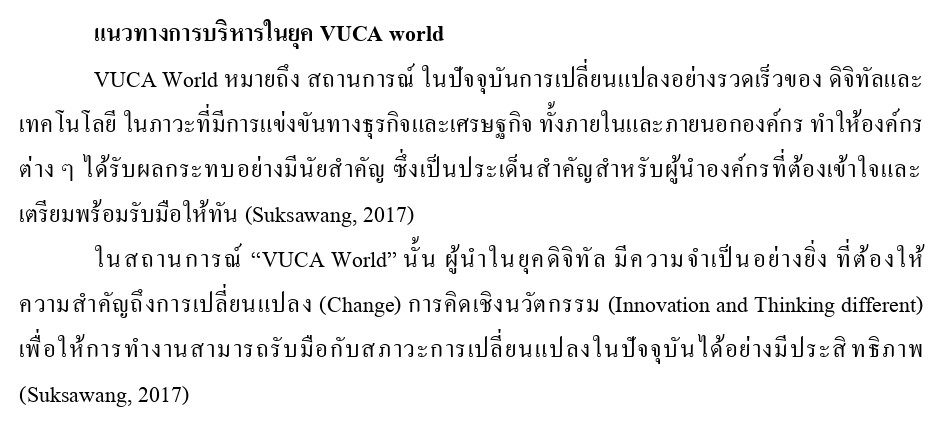ภาวะผู้นำเชิงนวัตกรรมทางการพยาบาล
คำสำคัญ:
ภาวะผู้นำ, นวัตกรรม, การพยาบาลบทคัดย่อ
บทความภาวะผู้นำเชิงนวัตกรรมทางการพยาบาล มีวัตถุประสงค์เพื่อศึกษาบทบาทจากการทบทวนวรรณกรรมของภาวะผู้นำเชิงนวัตกรรมทางการพยาบาล สถานการณ์ของโลกในปัจจุบันที่มีการเปลี่ยนแปลงอย่างรวดเร็วของ เทคโนโลยี การแข่งขัน ทั้งด้านเศรษฐกิจ ด้านสังคมและด้านสุขภาพ ทั้งภายในและภายนอกองค์กร ซึ่งเป็นประเด็นสำคัญสำหรับผู้นำองค์กรที่ต้องเข้าใจและเตรียมพร้อมในการพัฒนาให้ทันกับการเปลี่ยนแปลงที่เกิดขึ้นทั้งด้านเศรษฐกิจ ด้านสังคมและด้านสุขภาพ ที่เรียกว่าในยุค VUCA World การบริหารการเปลี่ยนแปลงในระบบบริการสุขภาพให้บังเกิดผลในทางปฏิบัติ เป็นปัจจัยสำคัญส่งผลทำให้องค์กรอยู่รอดและสามารถก้าวไปข้างหน้าในยุคที่มีการแข่งขันสูง การพัฒนาทางวิทยาศาสตร์และเทคโนโลยีที่ก้าวกระโดด ทำให้องค์กรที่ไม่สามารถปรับตัวได้ทัน แนวโน้มการเปลี่ยนแปลงด้านสุขภาพที่สำคัญที่กำลังคืบคลานเข้ามา ได้แก่ การคงไว้ซึ่งสุขภาพที่ดี การค้นหาผู้ป่วย
กลุ่มเสี่ยง การป้องกันการเกิดโรค การให้การรักษาโรคตั้งแต่ระยะเริ่มต้น โดยมีการนำเทคโนโลยีและนวัตกรรมเข้ามามีบทบาทในการวินิจฉัย และให้การรักษาผู้ป่วย
ดังนั้น บทบาทของผู้นำเชิงนวัตกรรมทางการพยาบาลมีความสำคัญอย่างยิ่งในการพัฒนาและปรับปรุงคุณภาพการดูแลผู้ป่วย รวมถึงการเพิ่มประสิทธิภาพของการทำงานในองค์กรพยาบาล โดยบทบาทหลัก ๆ ของผู้นำเชิงนวัตกรรมทางการพยาบาล ได้แก่ 1) การสร้างแรงบันดาลใจ 2) การพัฒนาทักษะการเป็นผู้นำเชิงนวัตกรรมในพยาบาล 3) การสนับสนุนการเปลี่ยนแปลง 4) การสร้างวัฒนธรรมนวัตกรรมในสถานพยาบาล 5) การใช้เทคโนโลยีใหม่กับการพยาบาลในยุคดิจิทัล 6) การสร้างความร่วมมือและ 7) การประเมินผลและปรับปรุงการดำเนินงานของผู้นำเชิงนวัตกรรม ผู้นำสถานบริการพยาบาลต้องมีภาวะผู้นำเชิงนวัตกรรมทางการพยาบาล และมีบทบาทสำคัญที่จะต้องบริหารจัดการ ทรัพยากรทางการการพยาบาลให้เกิดประสิทธิภาพ และความสมดุลเพื่อให้บริหารจัดการพยาบาล บรรลุผลสำเร็จเพื่อความปลอดภัยของผู้รับบริการ
เอกสารอ้างอิง
Bass, B. M., & Avolio, B. J. (1993). Transformation leadership and organizational culture. Public Administration Quarterly, 17(1), 114 - 122. https: www.jstor.org/stable/40862292
Berson, Y., & Avolio, B. J. (2004). Transformational leadership and the dissemination of organizational goals: A case study of a telecommunication firm. The Leadership Quarterly, 15(5), 625 - 646. https: doi.org/10.1016/j.leaqua.2004.07.003
Buachu, T., & Wivatvanit, S. (2017). Innovation Leadership of Head Nurse, Government University Hospital. Journal of Nursing Science Chulalongkorn Universityl, 29 (1), 140 - 153. https://digital. car.chula.ac.th/cuns/vol29/iss1/12/
Burns, J.M. (1978). Leadership. Harper & Row.
Changthong, T. (2019). The relationship between innovative leadership of school administrators and Digital organization of educational institutions In Tha Chana District, under the jurisdiction of Primary Education Area Office Surat Thani District 2. Graduate School. [Master’s thesis], Sukhothai Thammathirat Open University.
Duangthet, W. (2021). A Study of Situational Leadership of School Administrators, Rimkok Consortium under the secondart educational service area Chiangrai. [Master’s thesis], University of Phayao.
Hormniam, N. (2020). Health care Innovative Leadership in the Nursing Profession. Udonthani Hospital Medical Journal. 28(2). 244 – 253. https://he02.tci-thaijo.org/index.php/udhhosmj/ article/view/245099/166635
Kaihin, R., Singchungchai, P., & Pathumarak, N. (2021). Experience regarding Innovative Leadershipamong Head Nurses in Community Hospitals. The Southern College Network Journal of Nursing and Public Health. 8(2), 138 - 149. https://he01.tci-thaijo.org/index.php/ nmdjournal/article/view/255921/183383
Lumpkin, P (2021). Development of a program to strengthen creative leadership for school administrators. Under the jurisdiction of the Sakon Nakhon Primary Educational Service Area Office, Area 3. [Master’s thesis]. Mahasarakham University.
Lunenburg, F.C., & Ornstein, A.C. (1996). Educational Administration: Concepts and Practices. (2nd ed). Wadsworth.
Mongkhonvanit, C (2013). Organizational administration and educational personnel. Chulalongkorn University.
Motham, T. (2021). Leadership of executives that affects being a professional learning community inSchool under the jurisdiction of the Secondary Education District Office, District 22. [Master’s thesis], Sakon Nakhon Rajabhat University.
Roglong, P. (2022). Innovative leadership of executives and effectiveness of Chainat Province Secondary School. [Master’s thesis], Silpakorn University.
Rungruang, S., & Chantuek, T. (2017). Leadership development model leads to creating creative impetus. Veridian E - Journal,Silpakorn University, 10 (1), 29 - 40. https://he02.tci-thaijo. org/index.php/Veridian-E-Journal/article/view/79908
Saisirisuk, P. (2018). Innovative leadership of administrators in interdisciplinary secondary schools. Panchapakee District, under the jurisdiction of the Secondary Educational Service Area Office 4. [Master’s thesis]. Kasetsart University.
Sikhuntagasamit, H., & Pakdeejit, Y. (2022). Situational Leadership Roles of School Administrators in Small Schools Under Nakhon Sawan Primary Educational Service Area Office 1. Education Journal Faculty of Education, Nakhon Sawan Rajabhat University, 6(1), 178-190.
https://so02.tci-thaijo.org/index.php/edunsrujo/article/view/259058
Singchungchai, P. (2019). Innovative Leadership in Nursing Management. The Southern College Network Journal of Nursing and Public Health, 6 (1), 260 - 267. https://he01.tci-thaijo.org /index.php/scnet/article/view/154534
Singhachan, P. (2021). Development of a model for enhancing innovative leadership among executives. Educational institution under the Bueng Kan Primary Educational Service Area Office [Master’s thesis]. Sakon Nakhon Rajabhat University.
Suksawang, S. (2017, November 8). VUCA World, challenges for modern leaders. https://www. sasimasuk.com/16768188/vuca-world
Tatuy, W. (2022). The Relationship between innovative leadership, Readiness of Professional nursesand success in nursing admintrstion of an university hospital, The lower northern region. [Master’s Thesis]. Naresuan University.
Tongrugjun, N. (2024). Factors and Indicators of Innovative Leadership of Private School dministratorsin the Digital Era in the East Coast Southern Sub-Region of Thailand. Education Degree in Education administration Hatyai University.
Utterback, J.M. (2004). The dynamics of Innovation. (Research Report). https://www.researchgate.net/publication/286234989_The_dynamics_of_innovation/citations
Wanichawasin, P. (2017). Leadership development: from theory to good practice and case studies Leadership Development: Theories, Best Practices and Case Study. Intellectual.
Won, H. (2015). Clinical Leadership of Staff Nurse: A Phenomenology Study. Indian Journal of Science and Technology, 8(26), 1 - 5. http://doi.org/10.17485/ijst/2015/v8i26/80217.

ดาวน์โหลด
เผยแพร่แล้ว
รูปแบบการอ้างอิง
ฉบับ
ประเภทบทความ
สัญญาอนุญาต
ลิขสิทธิ์ (c) 2025 วารสารมหาวิทยาลัยนราธิวาสราชนครินทร์

อนุญาตภายใต้เงื่อนไข Creative Commons Attribution-NonCommercial-NoDerivatives 4.0 International License.



